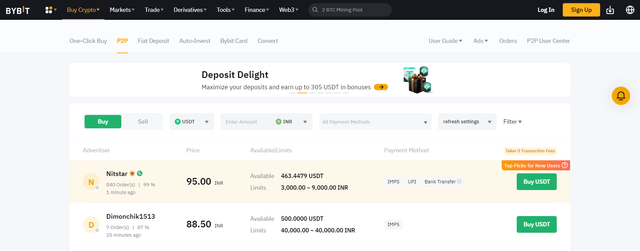P2P trading is another thing is that bybit has been doing good. But thing is that binance and few other exchanges can be scary but be careful while using it.

Safe Trading Practices in P2P Markets:
- Due diligence: Research the counterparty's reputation, check their ratings, and review their trade history before entering into a trade.
- Escrow: Use a trusted third-party escrow service to hold funds until both parties confirm the trade has been completed successfully.
- Clear communication: Clarify all terms and conditions of the trade, including payment methods, timing, and delivery details.
- Secure payment methods: Use secure payment methods like bank transfers, PayPal, or credit cards, which offer buyer protection and dispute resolution processes.
- Confirmation of delivery: Require signed confirmation of delivery from the courier or postal service to ensure goods have arrived safely.
- Inspect goods: Physically inspect goods upon arrival to ensure they match the description, quality, and quantity agreed upon.
- Resolve disputes: Establish a clear process for resolving disputes, including mediation, arbitration, or filing complaints with the relevant authorities.
Common Mistakes to Avoid in P2P Trading:
- Lack of research: Not doing enough research on the counterparty, their reputation, and their trade history.
- No escrow: Failing to use an escrow service, which leaves funds vulnerable to fraudulent activities.
- Poor communication: Miscommunication or lack of communication regarding trade details, leading to misunderstandings or disputes.
- Insecure payment methods: Using unsecured payment methods, such as wire transfers or cash, which offer little buyer protection.
- No confirmation of delivery: Failing to obtain signed confirmation of delivery, leaving room for disagreements on whether goods were delivered.
- No inspection: Not physically inspecting goods upon arrival, increasing the risk of receiving damaged or incorrect goods.
- No dispute resolution process: Failing to establish a clear process for resolving disputes, leading to drawn-out conflicts.
Pros of P2P Trading:
- Convenience: P2P trading offers flexibility and convenience, allowing individuals to trade directly without intermediaries.
- Cost savings: Eliminating intermediaries reduces costs, resulting in cheaper prices for buyers and higher profits for sellers.
- Increased efficiency: Direct trading streamlines the process, reducing the time required to complete a transaction.
- Greater variety: P2P trading opens up access to a broader range of goods and services, as individuals can now trade directly with one another.
- Community building: P2P trading fosters community development, encouraging individuals to connect and build relationships.
Cons of P2P Trading:
- Risk of fraud: P2P trading carries a heightened risk of fraud due to the absence of intermediaries, requiring extra caution.
- Limited protections: Without intermediaries, buyers and sellers have limited protections, such as no buyer protection programs or guarantees.
- Quality concerns: Goods may not meet expectations, and quality control becomes the responsibility of the buyer.
- Logistics challenges: Coordinating logistics, such as shipping and delivery, can prove difficult when dealing with individual sellers.
- Legal complexities: Legal issues may arise, particularly if international trade laws apply, and resolving disputes across borders can be complicated.
Downvoting a post can decrease pending rewards and make it less visible. Common reasons:
Submit